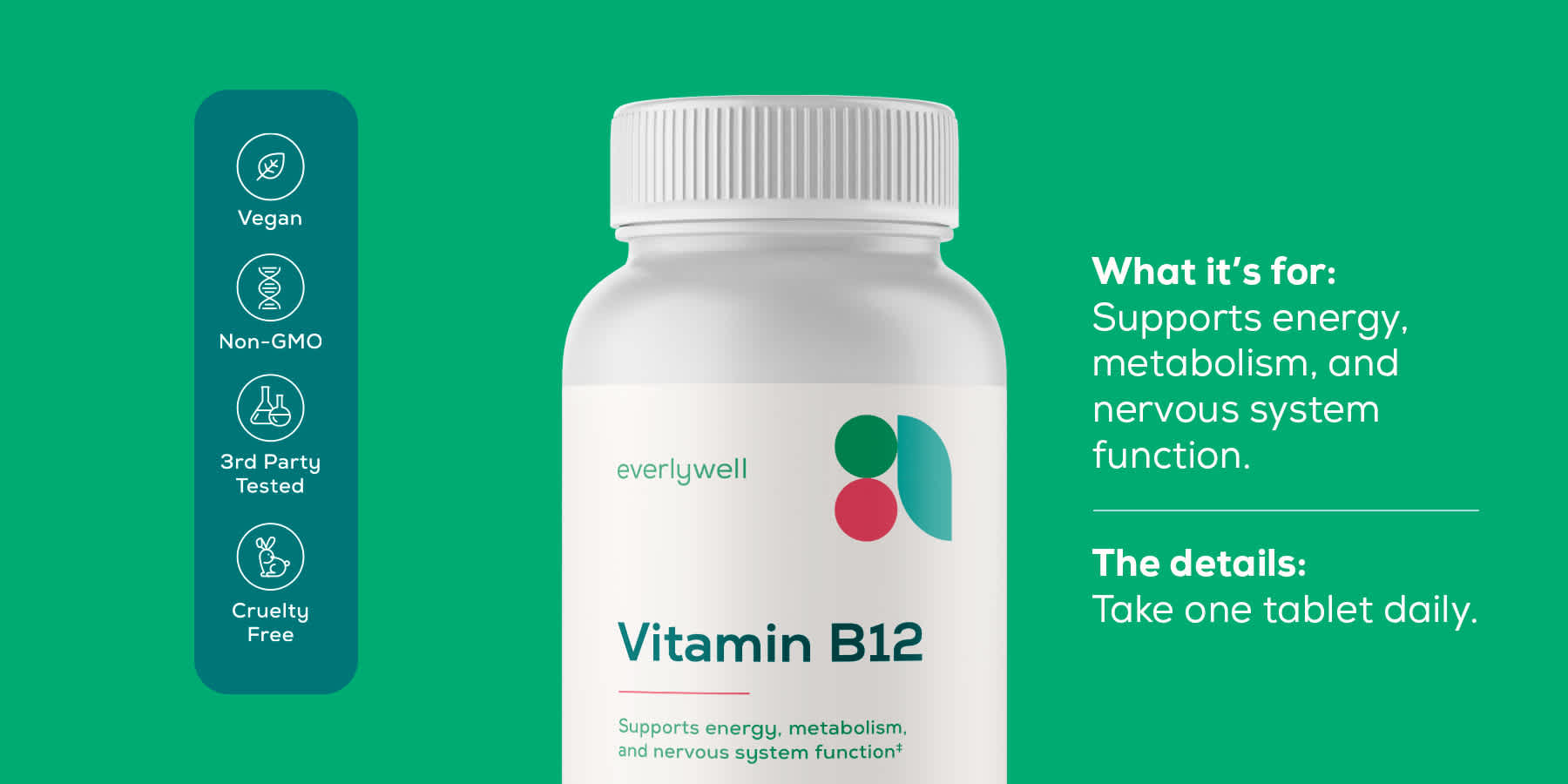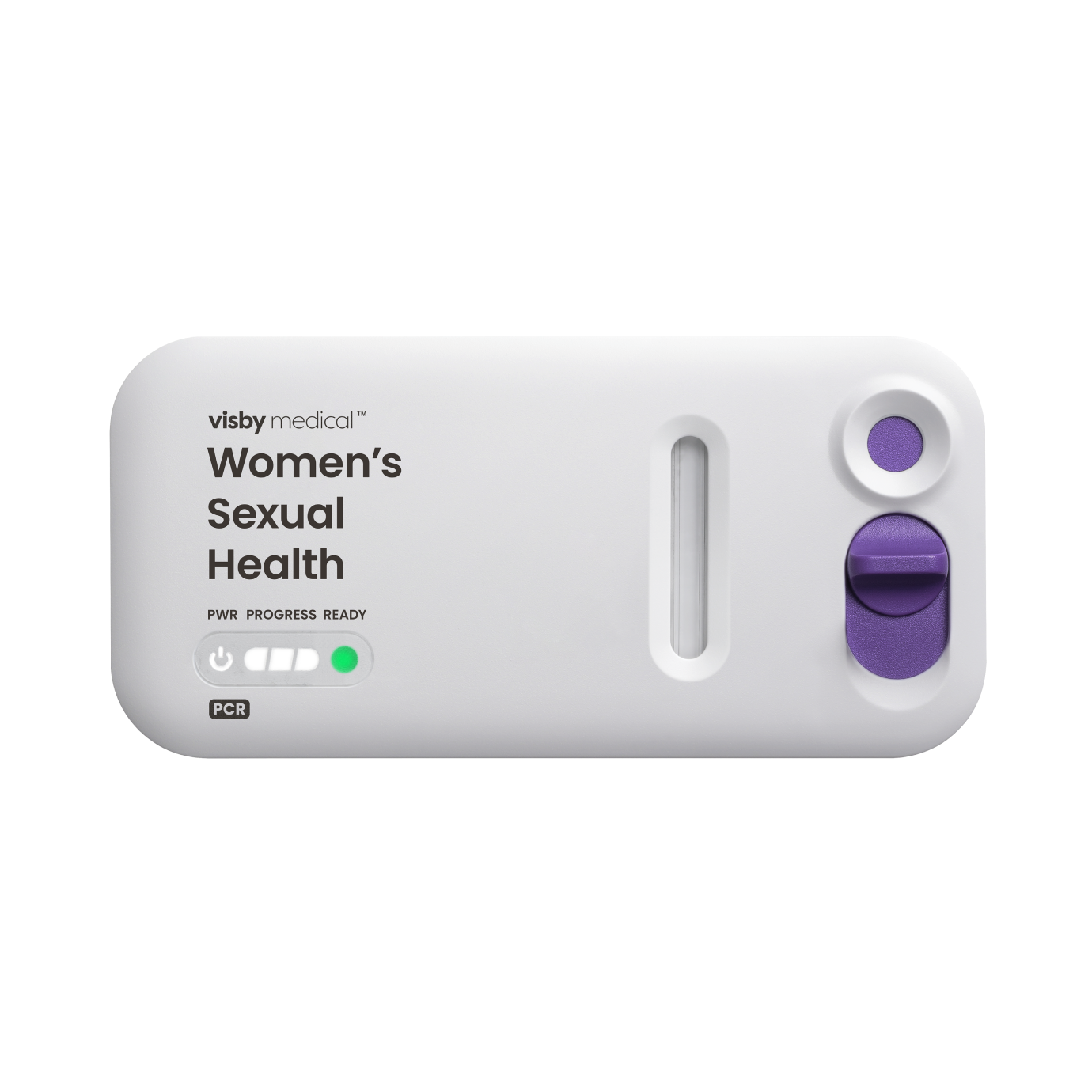
Updated Feb 07, 2024. Medically reviewed by Jillian Foglesong Stabile, MD, FAAFP. To give you technically accurate, evidence-based information, content published on the Everlywell blog is reviewed by credentialed professionals with expertise in medical and bioscience fields.
Table of contents
- What are the suggested amounts for vitamin B12 by age?
- Vitamin B12 doses for particular diagnoses and diets
- Why do you need vitamin B12?
- Benefits of vitamin B12
- Get your daily dose with Everlywell
- Related content
How important is vitamin B12, and how much vitamin B12 should I take? Different bodies need different things—and much like the amounts of food or water you take daily. Your daily dose of vitamin B12 should be tailored to your body’s unique needs. In most cases, dose recommendations are linked to your age and biological sex. [1]
Do you suffer from constant fatigue, or lack of energy? Feeling faint? Do you have heart palpitations often? In that case, you might have low vitamin B12 levels. [2] You may be looking to begin a B12 vitamin supplement to combat symptoms of a vitamin B12 deficiency or to fill nutritional gaps in your diet. Whether you're curious about B12 due to a recent diagnosis or simply want to learn, "How much vitamin B12 should I take?" we've compiled this guide with all body types and life circumstances in mind.
What are the suggested amounts for vitamin B12 by age?
The National Institutes of Health (NIH) recommends a daily B12 allowance of 2.4 mcg (micrograms) for the average adult. [3] However, vitamin B12 intake can be particularly important for children, and how much B12 per day you need can be linearly related to age.
Researchers at NIH and experts at Mount Sinai Hospital agree on the following recommendations for optimal vitamin B12 dosage per age group: [3]
Young Children (0-4) – Vitamin B12 is just as essential for newborns and toddlers. Experts recommend that children 6 months or younger consume 0.4 mcg a day, increasing to 0.5 mcg a day for 6 months to 1-year-old children, and 0.9 mcg daily for children aged 1 to 3. However, it is generally recommended to consult a healthcare provider before providing children with dietary supplements. Typically, diet can provide sufficient B12 for this age group. [1]
Kids and teens (4-18) – Research suggests that this age group should expect to increase their vitamin B12 dosage every 3 to 4 years until age 14. The recommendation for ages 4 to 8 is a 1.2 mcg daily dose. Meanwhile, 1.8 mcg is recommended for ages 9 to 13, and once individuals reach the age of 14, the dosage recommendation jumps to the adult standard of 2.4 mcg a day. [3]
Young adults (19+) – 2.4 mcg a day is the recommended B12 dosage for adults of all genders. However, your body doesn’t necessarily absorb all the B12 you consume. According to the NIH, you absorb only about 50% of the B12 you take in. [3] You’ll want to consider your particular routines to determine how best to supplement your diet with B12 or consider having your vitamin B levels tested.
Older adults (50+) – The National Research Center on Nutrition and Aging suggests that older adults do not need more than the suggested amount of 2.4 for younger adults. [3] However, studies contend that the body's vitamin B12 absorption ability may decrease with age. If you're older, you may also want to have your B12 level tested to gain the full picture of the dosage you need.
Vitamin B12 doses for particular diagnoses and diets
Adding a vitamin B12 supplement into your routine can be particularly necessary if you have a health condition or diet restriction that limits your B vitamin retention or intake. When it comes to vitamin B12 supplementation, pregnant and breastfeeding individuals need more oral B12. Here are a few common conditions or circumstances that may benefit from a high dose of B12 supplements: [1]
- Vegetarian or vegan diet – What foods have vitamin B12? The answer is meat products. Many people intake enough B12 through the consumption of meat products such as beef or fish. If your diet excludes meat as a food source, you may want to incorporate B12 fortified foods or consider a vitamin B12 supplement to avoid any deficiency-related complications.
- Low stomach acid – Individuals with conditions that equate to lower acid production in the stomach are prone to B12 deficiency, as acid is essential to the absorption process. Older people may also be more likely to experience lower stomach acid production. [1]
- Chronic illness – Those suffering from a chronic illness may be at higher risk of B12 deficiency due to side effects related to consistent medication.
- Gut health - For vitamin B12 to be absorbed effectively, it needs to bind with a protein called intrinsic factor, which is produced in the stomach. Disruptions in the gut, such as gastrointestinal disorders, diseases affecting the ileum, or conditions that affect the production of intrinsic factor, can lead to poor vitamin B12 absorption. [9]
- Pregnancy – According to the American Pregnancy Association, pregnant and breastfeeding individuals might consider increasing their B12 intake to 2.6 mcg a day. Increased B12 is essential for a growing baby’s brain and body development. [5]
If you’re considering an increase in B12, it’s important to note that B12 is a water-soluble, non-toxic compound, which means overdosing is unlikely. The National Resource Center for Nutrition and Aging confirms there is no set “upper-level limit” for vitamin B12 dosage. [4]
Why do you need vitamin B12?
B12 is a key player in your body’s day-to-day performance. [1] In particular, B12 assists with the development of 3 vital bodily elements:
- DNA – DNA, or deoxyribonucleic acid, is the building block system of a body’s cells. Think of DNA as a cell blueprint. Vitamin B12 supports DNA creation and stability. [1] Damaged DNA may increase your risk for cancer and contribute to other bodily breakdowns.
- Red blood cells – Red blood cells provide oxygen to the body. Without sufficient B12, your body begins to form abnormally large blood cells that cannot perform, leading to fatigue, weakness, and other malaise. [6]
- Central nervous system – Your nervous system is the body’s central command center for emotions and sensations. B12 is important to keep your nervous system working properly. [1] It also aids the production of “messenger systems” that direct and regulate the flow of hormones and transmitters. Conversely, a vitamin B12 deficiency may contribute to nerve damage, resulting in confusion, memory loss, and other physical impairments. [7]
Essentially, B12 carries two cofactor molecules—compounds that help enzymes perform their functions. [7] Think of enzymes as construction workers performing labor and cofactors as the tools necessary for the workers to get the job done.
Benefits of vitamin B12
As an essential vitamin, B12 contributes to your overall well-being. In particular, B12 is central to energy production and maintaining processes related to blood and the brain. Biological functions that B12 can help support may include: [1]
- Overall mood
- Energy levels
- Cognitive function
- Circulation
- Heart function
As an inherent part of DNA production, B12 can touch every faction of the body’s systems. The vitamin may also be linked to physical benefits, including: [1]
- Bone strength
- Skin health
- Reduced risk of congenital disabilities [8]
You can remedy low vitamin B12 levels with an oral supplement or vitamin B12 shots. What vitamins should I take daily? In addition to vitamin B12, experts also recommend adding vitamin B9 or folic acid. This is to help iron work better.
Get your daily dose with Everlywell
Ensuring your diet contains all the right nutrients you need can feel like putting together a puzzle—one with many vitamins, minerals, and other key ingredients. When it comes to keeping yourself healthy, B12 is a piece of the nutritional puzzle you don’t want to miss.
With that, Everlywell can help. Our no-stress, once-a-day B12 supplements may be just what your system needs. Capped at 300 mcg, our B12 tablets account for your body’s natural absorption rates.
With your wellness and patterns in mind, Everlywell products are non-GMO and vegan to give those with every kind of diet requirement the option to take control of their health.
Related content
Benefits of vitamin B12 for your hair
Vitamin B12 recommended dosage for older adults
Roles of vitamin B12 during pregnancy
Are multivitamins good for you?
References
- Vitamin B12. Mayo Clinic. URL. Published August 10, 2023. Accessed January 24, 2024.
- Vitamin B12 or folate deficiency anaemia. National Health Service. URL. Updated February, 2023. Accessed January 24, 2024.
- Vitamin B: Health Professional Fact Sheet. National Institutes of Health. URL. Updated December, 2023. Accessed January 24, 2024.
- Roles of Vitamin B in Pregnancy. American Pregnancy Association. URL. Updated June, 2022. Accessed January 24, 2024.
- Pernicious Anemia. Cleveland Clinic. URL. Updated February, 2022. Accessed January 24, 2024.
- Calderón-Ospina CA, Nava-Mesa MO. B Vitamins in the nervous system: Current knowledge of the biochemical modes of action and synergies of thiamine, pyridoxine, and cobalamin. CNS Neurosci Ther. 2020;26(1):5-13. doi:10.1111/cns.13207
- Behere RV, Deshmukh AS, Otiv S, Gupte MD, Yajnik CS. Maternal Vitamin B12 Status During Pregnancy and Its Association With Outcomes of Pregnancy and Health of the Offspring: A Systematic Review and Implications for Policy in India. Front Endocrinol (Lausanne). 2021;12:619176. Published 2021 Apr 12. doi:10.3389/fendo.2021.619176
- Vitamin B12. Harvard School of Public Health. URL. Updated March, 2023. Accessed January 24, 2024.
Jillian Foglesong Stabile, MD, FAAFP is a board-certified Family Physician. Since completing her residency training in 2010, she’s been practicing full-scope family medicine in a rural setting. Dr. Foglesong Stabile’s practice includes caring for patients of all ages for preventative care as well as chronic disease management. She also provides prenatal care and delivers babies. Dr. Foglesong Stabile completed a teaching fellowship in 2020 and teaches the family medicine clerkship for one of her local medical schools. Dr. Foglesong Stabile’s favorite thing about family medicine is the variety of patients she sees in her clinical practice.
Spotlight on
February is Cancer Prevention Month

86% of cancers aren't caught by recommended screenings. See what they're missing with a single blood draw.
Learn more
Explore Everlywell









